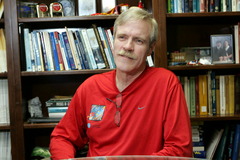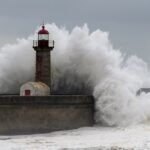 Wat vonden we onszelf en ons kleine Nederlandje weer even belangrijk afgelopen maandag 19 april 2010 met de IPCC-hoorzitting in ons werkelijk schitterende Tweede Kamergebouw. Natuurlijk zingen we met Robbert Dijkgraaf als leider van het VN-onderzoek naar structurele verbeterpunten voor het IPCC een aardig toontje mee, maar véél, heel véél gaat ons boven de pet en ontrekt zich aan ons zicht.
Wat vonden we onszelf en ons kleine Nederlandje weer even belangrijk afgelopen maandag 19 april 2010 met de IPCC-hoorzitting in ons werkelijk schitterende Tweede Kamergebouw. Natuurlijk zingen we met Robbert Dijkgraaf als leider van het VN-onderzoek naar structurele verbeterpunten voor het IPCC een aardig toontje mee, maar véél, heel véél gaat ons boven de pet en ontrekt zich aan ons zicht.
Mooie uitzondering
Wat sowieso buiten de klimaatpolitiek en de IPCC-boot valt, zijn de vele serieuze wetenschappers, die zoals Bas van Geel het aangaf, helemaal geen zin hebben om zich af te laten leiden van hun diepgravende wetenschappelijke werk door politiek gehakketak en allerlei commissies. Dan vormt John Christy, contributing author van het laatste IPCC-rapport, nog een hele mooie uitzondering: een eminent onderzoeker die uit maatschappelijke betrokkenheid – deels stoelend op zijn ervaringen als ontwikkelingswerker in Afrika – wel de moeite neemt om waar gewenst de politiek te voeden.
Voor en achter de schermen zijn er vele panels die John Christy laten opdraven om beter op de toekomst voorbereid te zijn, geheel in lijn met de post-normale nadruk op kwaliteit van beleid tegenover zekerheid die niet te bieden is. Nederland is daarbij een maatje te klein gebleken. Christy bevestigd aan ons dat in zijn geval gewoon zijn overvolle agenda en zijn andere prioriteiten debet waren aan zijn afwezigheid maandag:
I don’t remember much about this, but I believe I told them I would be unable to attend due to my heavy schedule here but that they were interested in written remarks. I sent three items. The first two were the 3-minute talk I gave to the IPCC Lead Authors in March 2009 at the meeting in Hawaii (download pdf) with a poster (download pdf). I was hoping for an IPCC chapter written by credentialed scientists whose view was one of low climate sensitivity. The last thing was the Nature piece (mine is the last one) also attached in which I brought up the Wiki idea (download pdf). John C.
Dat weten we weer even waar we staan als kikkerlandje: “I don’t remember much about this, but I believe I told them…” Nu zouden we omgekeerd ook John Christy kunnen ignoreren, maar dit zou onverstandig zijn. Als we iets kunnen leren van de betogen met betrekking tot post-normale wetenschap (zie deze nieuwe van Ravetz), dan is het dat kwaliteit van beleid in tijden van fundamentele wetenschappelijke onzekerheid alleen mogelijk is door je pro-actief te verdiepen in een breed spectrum aan geluiden en tegengeluiden.
Hieronder toch maar de twee door Christy ingediende teksten integraal:
3 minute talk voor IPCC lead authors
Can the IPCC Allow a Section of Alternative Views Authoredby Equally Credentialed Climate Scientists?John R. ChristyUniversity of Alabama in HuntsvilleI want you all to understand this: No one is holding a gun to my head and no one is paying me money either above or under the table to arrive at the conclusions I (and others) have come to. I propose that the IPCC allow for wellcredentialed climate scientists to craft a chapter on an alternative view presenting evidence for low climate sensitivity to greenhouse gases than has been the IPCC’s recent message – all based on published information.In other words, I am proposing that the AR5 be a true Scientific Assessment, not a document designed for uniformity and consensus. In a scientific area as uncertainas climate, the opinions of all are required.Three quick examples are on the poster (download pdf).
- First, the iconic mean surface temperature is a poor proxy for detecting greenhouse gas influences for reasons shown. And, this metric is not well-observed in any case.
- Secondly, many of the so-called metrics of human-induced climate change are not changing at rates policymakers have assumed and the media promotes with the indulgence of the IPCC Leadership. And, other variables showing change are still within the magnitudes of long-term natural variations.
- Thirdly, confidence that the climate system is highly sensitive to greenhouse gases can been shown to be overstated due to assumptions about how the sensitivity is calculated. Latest measurements clearly suggest a strong negative feedback in the short wave – in other words, in warming episodes, clouds respond to cool the climate. Another problem with popular sensitivity estimates is the dependence on essentially one century of an oblique greenhouse-proxy (mean surface temperature) combined with the notion that all of the natural, multi-decadal variability can be defined so accurately that the left-over warming is assumed to be human-induced. The investigation rather should examine all levels of natural variability that have been observed and seek to defensibly eliminate those as possible causes. An alternative view is necessary, one that is not censured for the so-called purpose of consensus. This will present to our policymakers an honest picture of scientific discourse and process. I submit this proposal because our level of ignorance of the climate system is still enormous and our policymakers need to know that. We have much work to do.
Christy’s bijdrage aan opniniestuk Mike Hulme in Nature, Vol 463, 11 februari 2010 (download pdf)
Open debate: Wikipedia-styleJohn R. Christy Lead author (AR3), University of Alabama in Huntsville, USASince 1992 I have served as an IPCC contributor and in 2001, as a lead author. My experience has left me of the firm conviction that the IPCC should be removed from UN oversight.
The IPCC selects lead authors from the pool of those nominated by individual governments. Over time, many governments nominated only authors who were aligned with stated policy. Indeed, the selections for the IPCC Fourth Assessment Report represented a disturbing homogeneity of thought regarding humans and climate.
Selected lead authors have the last word in the review cycle and so control the message, often ignoring or marginalizing dissenting comments. ‘Consensus’ and manufactured confidence ensued. The recent leaking of e-mails from the Climatic Research Unit at the University of East Anglia in Norwich, UK, put on display the unsavoury cycle of marginalizing different viewpoints. Now several errors of overstatement, such as that of the melting rate of the Himalayan glaciers, have been exposed.
Unfortunately, prestigious media, including Nature, became cheerleaders for these official reports, followed then by governments trying to enact policies that drastically reduced emissions to ‘stop global warming’ while increasing energy costs.
I recommended last year that the next IPCC report invites published authors to write about the evidence for low climate sensitivity and other issues. The IPCC then would be a true reflection of the heterogeneity of scientific views, an ‘honest broker’, rather than an echo chamber. My recommendation assumed a business-as-usual IPCC process.
However, voluminous printed reports, issued every six years by government-nominated authors, cannot accommodate the rapid and chaotic development of scientific information today. An idea we pitched a few years ago that is now worth reviving was to establish a living, ‘Wikipedia-IPCC’. Groups of four to eight lead authors, chosen by learned societies, would serve in rotating, overlapping three-year terms to manage sections organized by science and policy questions (similar to the Fourth Assessment Report). The authors would strike a balance between the free-for-all of true science and the need for summary statements.
Controversies would be refereed by the lead authors, but with input from all sides in the text, with links to original documents and data. The result would be more useful than occasional big books and would be a more honest representation of what our fledgling science can offer. Defining and following rules for this idea would be agonizing, but would provide greater openness.
The truth, and this is frustrating for policymakers, is that scientists’ ignorance of the climate system is enormous. There is still much messy, contentious, snail-paced and now, hopefully, transparent work to do.






Christy's eerste twee punten (over het IPCC) stemmen volledig overeen met mijn mening: Het fundamentele probleem de milieu-ministeries het IPCC aansturen en beoordelen.
Dit is politiek probleem. De Tweede Kamer kan evenvoudig deze verantwoordelijkheid van VROM naar OCW, NWO of KNAW schuiven.
Richard,
Dank voor je publieke bijdrage. Net als die van John Christy schept dit helderheid t.a.v. wat er mis gaat in samenstelling en aansturing van het IPCC.
Ik denk nog steeds dat jouw kritiek beter past binnen de IEG van de InterAcademy Council, die kan nu op het juiste niveau waarborgen voor wetenschappelijke transparantie en 'diversity of views' gaan afdwingen.
Niet alleen in Nederland, maar ook in andere landen die de Lead Authors nomineren, zou dit niet vanuit de Ministry of the Environment maar bijv. vanuit de academische societies dienen te gebeuren. Dit voorkomt de vicieuze cirkel:
beleidsambtenaar –> wetenschap in IPCC –> beleidsaanbevelingen IPCC –> beleidsambtenaar…
Bob
Bob: Mee eens. Maar er is geen enkele reden dat Nederland hierin op de rest van de wereld zou moeten wachten. In tegendeel. Nederland, Duitsland en het Verenigd Koninkrijk zijn de grootste zondaars in het aanleveren van IPCC auteurs met een bedenkelijk wetenschappelijk statuur. En dit is een beslissing die de Tweede Kamer kan maken.
Richard,
Ja… Een probleem is, onder meer, dat politici en dus ook kamerleden een zeker belang hebben bij de huidige praktijk, waarin 'policymakers' vanuit VROM (en de daaraan gelieerde instituties) de wetenschappelijke resultaten beïnvloeden en daarmee hun eigen werk (het omzetten van wetenschappelijk inzichten naar politieke/beleids-keuzes) aanzienlijk versimpelen!
Indien de wetenschappelijke uitkomsten (ook de summaries) van het IPCC volledig onafhankelijk door de wetenschappelijke community opgesteld worden, zal het ongetwijfeld méér werk worden voor beleidsambtenaren en politici om dit te vertalen naar politieke keuzes… Nu is het een proces van 'tick the boxes', deels voorgekookt door de eigen beleidsambtenaren, en in de toekomst zal het een forse inspanning en politieke durf gaan vragen om een bepaald beleid ingang te doen vinden.
Eigenlijk zouden de disciplines zich dus weer moeten concentreren op de eigen verantwoordelijkheid: wetenschappers doen wetenschap, politici bouwen aan de maatschappelijke steun voor beleid?
Indien de InterAcadamy Council er in slaagt om het 'primaat van de wetenschap' te doen gelden – professionele kwaliteit staat voorop en mag in geen enkel opzicht geweld aangedaan worden – is dat een aanzienlijke stap vooruit.
Cheers,
Bob
Niks van de horzitting teruggezien in de main stream media trouwens.
Achter al de nieuwe voorstellen tot verbetering van procedures (zoals van Christy en van Tol) gaat, lijkt mij, onbewust of ongewild toch nog steeds het idee schuil dat de mens het wereldklimaat verandert. Het enige logische voorstel vanuit de sceptische(dus wetenschappelijke)visie zou moeten zijn om deze jonge tak van wetenschap niet anders te laten functioneren, dan vele andere onderzoeksgebieden, en dus totaal te stoppen met het wereldwijde politieke circus dat eromheen is opgebouwd. Als er iets zinnigs te melden valt, dan horen de beleidmakers dat uiteindelijk wel. Wel jammer natuurlijk voor al de politiek zo buitengewoon zichtbare onderzoekers (ook de niet-alarmistische!) om uit de publiciteit te verdwijnen, maar ja, dat moet dan maar.
CW Schoneveld en Woedende kok,
Even over je opmerking: '[..] gaat, lijkt mij, onbewust of ongewild toch nog steeds het idee schuil dat de mens het wereldklimaat verandert.' Als je de 10 punten leest die Richard Tol op de hoorzitting heeft ingebracht, dan staat prominent op 1:
1. Voor zover ik weet verandert het klimaat echt en wordt dit voor de laatste 150 jaar grotendeels door de mens veroorzaakt. Mijn eigen onderzoek laat zien dat klimaatverandering een probleem is dat opgelost moet worden. Er is overtuigend bewijs dat klimaatverandering niet het grootste probleem ter wereld is, en het is waarschijnlijk ook niet het grootste milieuprobleem. Alles wijst erop dat politiek haalbaar klimaatbeleid duur is.
Daar lijkt mij niets onbewust of ongewild aan! Net als verreweg de meeste échte wetenschappers die nu al jaren metingen doen aan het klimaat, weet Prof. Tol natuurlijk dat de atmosfeer de laatste anderhalve eeuw is opgewarmd, grotendeels door de invloed van de broeikasgassen die onze industriële samenleving nu eenmaal produceert.
Terecht vraagt Richard Tol aandacht voor een rationele kosten/baten afweging van klimaatbeleid, in plaats van als een ongeleid projectiel maatregelen door te voeren waarvan het effect symbolisch en discutabel is. Ik vind het erg jammer dat de "anti AGW-beweging" nog steeds de ogen sluit voor de realiteit, en zich verschuilt achter botte ontkenning zoals blijkt uit jullie berichtje. In plaats daarvan zou het beter zijn om de discussie te verplaatsen naar haalbaarheid en betaalbaarheid van klimaatbeleid.
– een fysicus, geen econoom.
Zo is dat.
Een skepticus betwijfelt of AGW catastrofale gevolgen zal hebben.
Een ontkenner/denialist denkt ondanks bergen bewijzen dat er geen opwarming is en/of dat deze niet veroorzaakt wordt door menselijk handelen.
Er is een verschil tussen die twee. De laatste moet zich niet achter de eerste verschuilen en de eerste dient zich duidelijk van de laatste te distantiëren.
Ik ben het helemaal en van harte eens met de opmerking van Schoneveld. Tol en anderen wijzen erop dat klimaatwetenschap tot een gepolitiseerd bedrijf is verworden. Met het doen van allerlei verbeteringsvoorstellen verander je daar weinig aan en bedrijft men dus mede politiek.
Wat “de klimaatwetenschap” er beter van wordt ontgaat mij.
Wat was jullie inbreng in de hoorzitting nu eigenlijk? Daar lees ik helemaal niets over…
Boog,
Voor zover het mij verteld is door collega's, hebben Rörsch en Labohm voor de zoveelste keer hun drogredenen herhaald, die ondertussen allang zijn weerlegd in de wetenschappelijke literatuur.
Blijkbaar hecht men er aan om de "tactiek van de kapotte plaat" te hanteren.
De inbreng van Salomon Kronenberg dat klimaat- en energiebeleid beter gescheiden kunnen worden is interessant, maar lijkt me niet reëel zolang we nog voornamelijk fossiele brandstoffen inzetten… Dat was het wel, meen ik.
En Marcel, Hajo, Rypke's inbreng?